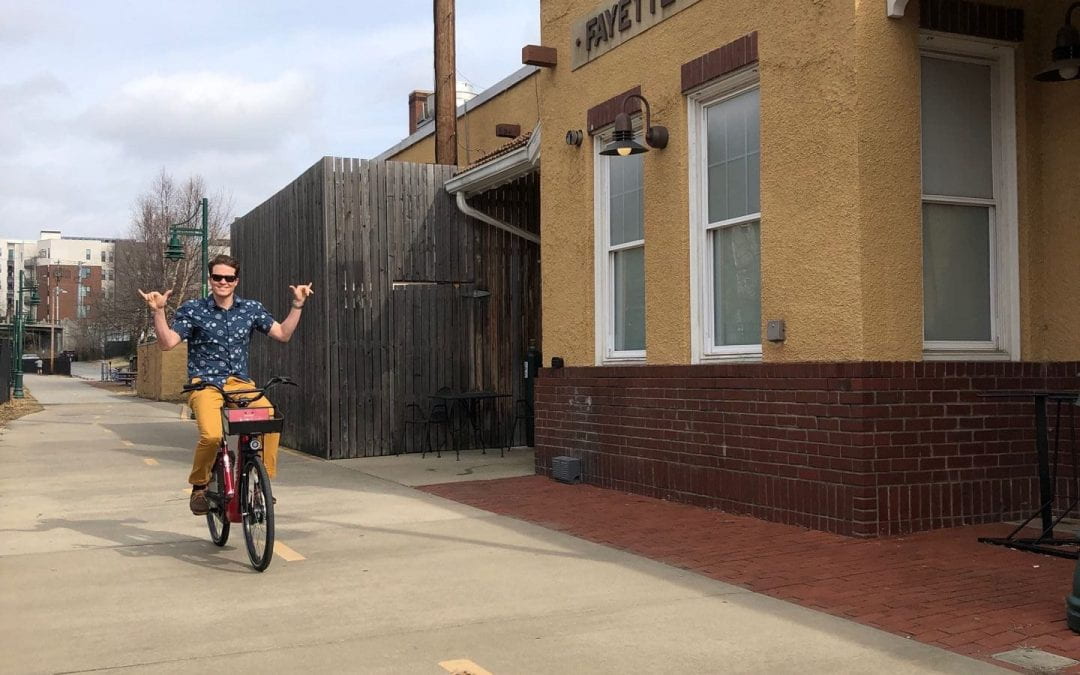The bicycle is the most energy efficient mode of transportation ever devised.
 With an input of about enough energy to power a lightbulb, a bicycle and an adult rider can get going about 10 mph on flat ground. But bikes stay this efficient only if you keep moving. Apply your brakes or coast to a stop going uphill and all that lovely kinetic energy vanishes – and in Fayetteville, we have plenty of hills. When driving a car, you press the accelerator to get up to speed. On a bike, you’ve got to earn back all that speed.
With an input of about enough energy to power a lightbulb, a bicycle and an adult rider can get going about 10 mph on flat ground. But bikes stay this efficient only if you keep moving. Apply your brakes or coast to a stop going uphill and all that lovely kinetic energy vanishes – and in Fayetteville, we have plenty of hills. When driving a car, you press the accelerator to get up to speed. On a bike, you’ve got to earn back all that speed.
Cycling is growing in popularity in Arkansas. The momentum cyclists are building here is every bit as important as the inertia they use to keep moving around roads and trails.
That’s why Arkansas’ one-year-old Act 650 is so important. Governor Asa Hutchinson signed the bill into law April 2, 2019, making it just the third of its kind in the nation after Idaho and Delaware.
No more losing momentum at empty intersections thanks to this AR law
The law allows people on bikes to treat stop signs as yields and treat red lights as stop signs. A cyclist must still stop to avoid any immediate hazards, and yield to pedestrians and traffic in the intersection.
Simply put, Act 650 will allow people on bikes to retain and use their rolling energy. As someone whose job is to get more people to ride bikes, I couldn’t be happier. Biking in Arkansas will be more fun, more free, and more safe. The year after Idaho enacted its law, cycling injuries dropped by 14 percent. More than 35 years later, studies keep suggesting that the law hasn’t made biking there less safe.
Does the rolling stop (or, in current biking parlance, “Idaho stop”) unfairly favor cyclists on our roads? I argue no. We commonly apply special permissions and restrictions to different vehicles, such as when we set tractor trailers’ speed limit lower on some highways. And in practice, a person on a bike has 360-degree visibility, can stop across short distances, and can hear in all directions — all advantages over a driver inside a glass-and-steel car. The law is just granting the cyclist greater license to use their best judgement.
 Taking agency away from police and giving it to individual citizens is a common definition of responsible, limited governance. Yet I’ve read criticism of this law as somehow leftist: a letter to the editor of this paper suggested it represents the “liberalization of bike laws”. But the legislatures of Idaho and Arkansas aren’t exactly what I’d call liberal strongholds. These laws empower people to take responsibility for their own well-being, while disempowering police from ticketing people who conduct themselves safely. If anything, this is a genuinely libertarian measure that, in the Arkansas state legislature, drew widespread support from Democrats and Republicans alike.
Taking agency away from police and giving it to individual citizens is a common definition of responsible, limited governance. Yet I’ve read criticism of this law as somehow leftist: a letter to the editor of this paper suggested it represents the “liberalization of bike laws”. But the legislatures of Idaho and Arkansas aren’t exactly what I’d call liberal strongholds. These laws empower people to take responsibility for their own well-being, while disempowering police from ticketing people who conduct themselves safely. If anything, this is a genuinely libertarian measure that, in the Arkansas state legislature, drew widespread support from Democrats and Republicans alike.
So when you see a cyclist look both ways and roll on through that stop sign, don’t worry. That’s an Arkansas stop you’ve just witnessed, and it’s truly cycling in its natural state.
Content by Dane Eifling Edited for Blog by Linden Cheek

